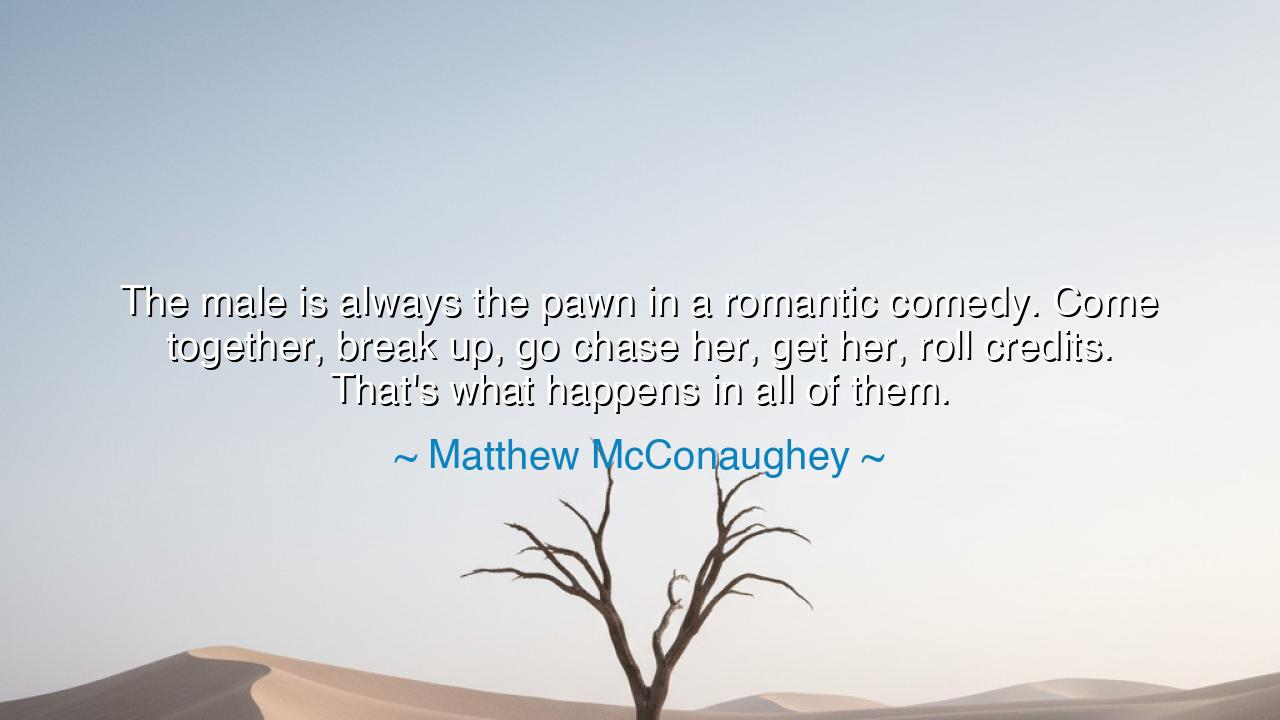
The male is always the pawn in a romantic comedy. Come together
The male is always the pawn in a romantic comedy. Come together, break up, go chase her, get her, roll credits. That's what happens in all of them.






Gather, O children of wisdom, and listen to the words of Matthew McConaughey, who speaks with insight into the nature of storytelling and the role of the male protagonist in the world of romantic comedy. He said, “The male is always the pawn in a romantic comedy. Come together, break up, go chase her, get her, roll credits. That’s what happens in all of them.” In these words, McConaughey reveals a truth that stretches beyond the surface of cinema and into the very heart of romantic narratives. The male, in these stories, is not often the true hero of his own journey but a figure shaped and defined by the whims of love and the pursuit of the woman he desires. His role is often one of action, moving through the stages of attraction, loss, and eventual reconciliation, all driven by the forces of romantic desire.
In the ancient tales of myth and legend, we find the same recurring pattern: the hero, driven by love and desire, embarks on a quest, facing trials and tribulations. Orpheus, the great poet and musician of Greek mythology, descends into the underworld to retrieve his wife, Eurydice, only to lose her again because of a moment of doubt. His journey is defined by his relentless pursuit of love, yet it is also marked by his failures, his mistakes, and his inability to control fate. Like the male protagonist in a romantic comedy, Orpheus is not entirely master of his own destiny; he is driven by an external force—love—and, despite his profound abilities, he is ultimately a pawn in the grand game of fate.
Similarly, in many of the romantic comedies McConaughey speaks of, the male character is often placed in a situation where his fate is not his own, but is instead dictated by the woman he seeks. The male’s journey—the act of coming together, breaking up, and then chasing after the woman—becomes an almost ritualistic dance, where the central conflict revolves around his pursuit of love rather than his own self-discovery. This reflects a timeless pattern in storytelling: the hero’s journey, but one in which the hero’s actions are not driven by internal transformation, but by the external goal of winning the heart of another.
Yet, there is wisdom in McConaughey’s words. For the male in the romantic comedy, much like Orpheus, is often required to face not just external obstacles, but also his own limitations and flaws. The pursuit of the woman, like the quest for Eurydice, is often a test of character, an exploration of what the man is willing to sacrifice in order to achieve his desire. In these stories, the male protagonist does not merely chase love; he transforms through the pursuit—he learns humility, patience, and ultimately, the capacity for selflessness. His journey, though seemingly one of outward action, is also an inward one, forcing him to confront his own vulnerabilities and insecurities.
We see this pattern in great stories across cultures. Consider the tale of King Arthur and his knights, who, though mighty in battle, are also pawns in the game of destiny, driven by the need to prove their worthiness and loyalty. Lancelot, Arthur’s greatest knight, is often torn between his loyalty to Arthur and his love for Guinevere, symbolizing the internal conflict between duty and desire. Lancelot’s journey, like the male protagonist in a romantic comedy, is shaped by forces beyond his control—his love for Guinevere and the consequences of that love. His actions are determined by the external pull of romance, even as he navigates his own sense of honor and shame. In this, the male hero’s story is not one of independent strength, but of sacrifice and learning in the face of overwhelming desire.
Thus, O children, the lesson McConaughey imparts is one of recognition: the male in many romantic tales, while appearing to drive the action, is often not the true master of the story. He is shaped by love, desire, and external forces, his role in the story defined not by his own inner journey, but by the pursuit of another. Yet, in this pursuit, there is much to be learned: the value of self-reflection, of understanding the power of love to transform, and of recognizing the balance between action and introspection.
I say to you, O children, recognize the power of love, but also understand the role it plays in shaping the journeys of the heart. Do not simply chase the desires of others, but seek to understand how love can shape you from the inside. Like the male protagonist in the romantic comedy, we too must be willing to transform in the face of our desires, understanding that love is not just about the external chase, but about the inner growth that occurs through the process of loving and being loved. Be the hero of your own story, not simply a pawn in someone else’s game, and in doing so, you will find the true depth and meaning of the journey.






AAdministratorAdministrator
Welcome, honored guests. Please leave a comment, we will respond soon